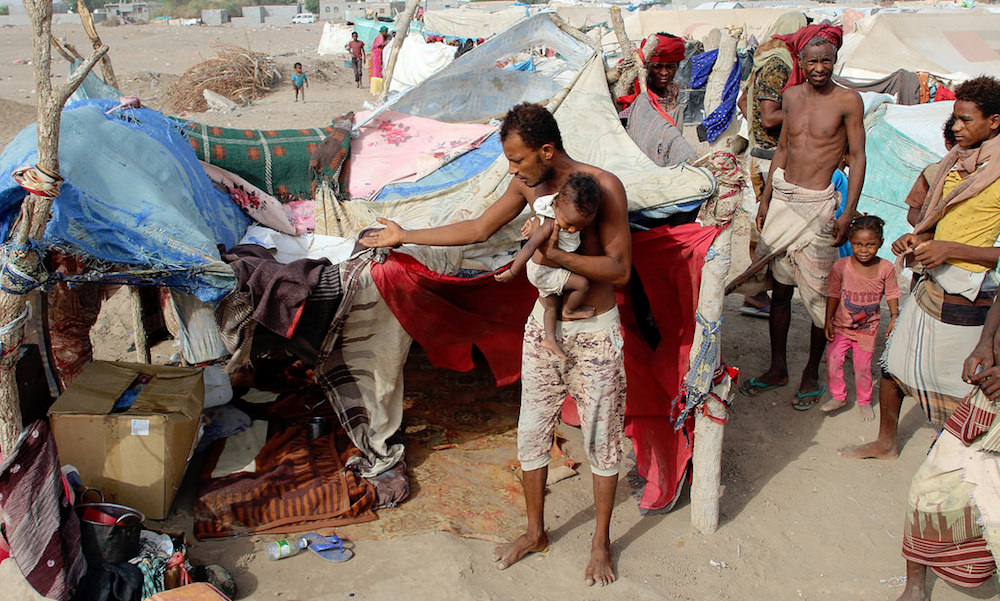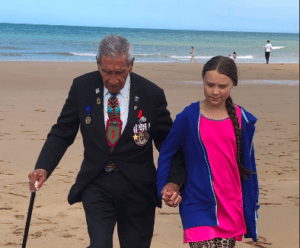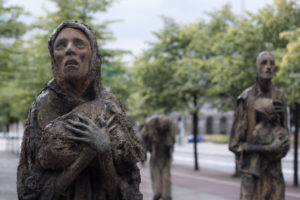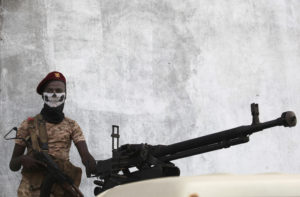Khashoggi Case Puts Light on Yemen’s Plight
The worst humanitarian crisis in today’s world has largely been ignored by the media. Now that may be changing. Yemenis displaced by war gather outside their tent camp near the city of Aden. (Fawaz Salman / Reuters)
Yemenis displaced by war gather outside their tent camp near the city of Aden. (Fawaz Salman / Reuters)
Truthdig is proud to present this article as part of its Global Voices: Truthdig Women Reporting, a series from a network of female correspondents around the world who are dedicated to pursuing truth within their countries and elsewhere.
The murder of Saudi journalist Jamal Khashoggi in October ironically put the spotlight on millions of Yemenis who have suffered throughout a four-year bloody and destructive war.
In particular, the U.S. media has boosted its scrutiny of Saudi and Emirati atrocities in Yemen. The media—as well as U.S. think tanks—have placed the murder in the overall context of Mohammed bin Salman’s excesses in the Middle East.
Media attention played a significant role in the rebuke the U.S. Senate recently delivered to President Trump, whose policy is to stand by the Saudis. The Senate passed a resolution Dec. 13 to end U.S. military support for Saudi Arabia in Yemen and also blamed Salman, the Saudi crown prince, for the killing of Khashoggi.
The Senate resolution isn’t expected to pass in the House, but the vote was still welcome news to many in Yemen. “This is an overdue vote,” says Sarah Ahmed, a humanitarian worker in the capital city of Sana’a. “It’s been absolutely cruel for President Trump’s administration to assist a military operation, despite all evidence of the humanitarian catastrophe and war crimes committed in Yemen.”
Following mounting media pressure, top Trump administration officials also called for a cease-fire in the conflict, and Yemen peace talks commenced in Sweden. The talks addressed humanitarian concerns, and some steps such as a prisoner exchange were agreed upon, but the parties failed to reach accord on economic and political issues. Another round of peace talks is scheduled for the end of next month.
Khashoggi, the Tipping Point
The war in Yemen has created what the U.N. secretary-general called the “worst humanitarian crisis” in the world today. The conflict began in 2015 as a civil war between the incoming Yemeni government and the Houthi militia group. Saudi Arabia intervened with deadly airstrikes, leading an international coalition into the battle. According to a recent report, the violence killed an estimated 60,000 Yemenis in the last two years. An additional 85,000 may have starved to death, and millions more could face that fate.
During the Obama and Trump administrations, the U.S. has supported the Saudi-led coalition, providing intelligence assistance, selling billions of dollars’ worth of weapons and, until last month, refueling Saudi aircraft during bombing raids. Reports by groups such as Human Rights Watch suggest that if war crimes are committed using these U.S.-supplied weapons—and if the Trump administration doesn’t investigate that issue—the U.S. risks complicity in the crimes. The United Kingdom also has been a key supporter of the Saudi-led coalition and has assisted it with sizable arms sales.
Yet before the Khashoggi killing, the media in the U.S. published only limited coverage of the conflict. “I remember in the very beginning the press used to occasionally cover it and rarely mention the U.S. role,” says Alex Emmons, an Intercept reporter who covers Yemen on Capitol Hill. “I actually used to think every time a terrible Saudi-led airstrike attack would happen that this attack would definitely get huge attention and wouldn’t be swept under the rug, but eventually I would get disappointed and things would tend to be overlooked.”
Critics pointed to some U.S. media outlets for inadequate reporting of the conflict. MSNBC didn’t mention the U.S. role in Yemen once during the course of a year, and “60 Minutes” aired a 13-minute segment on the human cost and devastation of the war but failed to mention U.S. support of Saudi Arabia.
Things changed after Khashoggi’s murder, with The New York Times taking the lead. The Times stepped up its coverage of the Yemen conflict, dedicating prominent space on its front page for the first time since the war began and featuring a photo of a skeletal Yemeni girl who later died of starvation.
In past years, Saudi restrictions had added to the dearth of international media coverage—for example, Saudi Arabia closed the Sana’a airport and refused entry to journalists.
“(Being) denied access by the Saudi-led coalition to Yemen has always been a problem for me and other journalists in the U.S., but the murder of Khashoggi has made everybody more skeptical of Saudi Arabia and more interested in scrutinizing Saudi Arabia’s actions,” said award-winning New York Times columnist Nicolas Kristof when this reporter interviewed him at the U.N. “The media’s interest in Yemen (also) stems from the U.N. warnings about losing the fight against famine in Yemen. The Times’ photos were clear and devastating proof.”
In recent months, The Washington Post has produced extensive coverage of Khashoggi’s murder and of atrocities committed by Saudi Arabia in Yemen. Following Khashoggi’s death, the Post also published a controversial op-ed written by Mohammed Ali al-Houthi, head of the Houthi militia’s supreme revolutionary committee. In the op-ed, Houthi condemned Saudi Arabia’s war crimes in Yemen and the Khashoggi murder.
Critics then condemned the Post for providing space to someone who himself has committed war crimes. “Mohammed Ali al-Houthi ‘met the designation criteria’ to be sanctioned by the U.N. Security Council,” wrote Gregory Johnsen, former member of a U.N. panel of experts on Yemen. “In other words, he is someone who has committed documented violations and crimes.”
Al-Houthi also has been responsible for the imprisonment of Yemeni journalists, another critical factor that has limited coverage of the conflict. The Houthis’ war on media groups began when the militia leader Abdelmalek al-Houthi, cousin of Mohammed Ali al-Houthi, said in 2016 that “the media workers are more dangerous to our country (Yemen) than the nationalist and warring mercenaries.”
Dozens of Yemeni journalists have been detained in Houthi-run prisons, but international agencies often do not recognize them as captives because the Houthis are a rebel group and not a government. “If the Houthis were considered a governing authority, Yemen would have the fifth highest number of journalists in jail in the world,” according to the Committee to Protect Journalists.
Karen Attiah, global opinions editor at The Washington Post, didn’t respond to an email inquiring about the reasons for publishing Al-Houthi’s op-ed. However, she said in a tweet that “We have given space to … all sides of many of these debates roiling the region. And yes, including the abusive ones.”
Other observers agree that all voices in the Yemen conflict should be heard. “Media is supposed to cover what is, not what ought to be,” says Nabeel Khoury, a former U.S. diplomat to Yemen. “The Washington Post owes its readers the facts about the actors on the ground in any conflict—what they want, what their strategies are, etc.”
However, media outlets “should be careful not to overdo it, thereby turning their coverage into a platform for any combatant’s propaganda,” Khoury says. “In that vein, Saudi Arabia and the UAE [United Arab Emirates] buy influence via pages in major papers and grants to think tanks. The Houthis don’t have as much cash to throw around.”
Yemen and U.S. Think Tanks
The think tanks Khoury mentioned have played a critical role in providing information about the war in Yemen, but many of these institutes are financially backed by Persian Gulf countries including Saudi Arabia. Leading think tanks such as the Brookings Institution and the Middle East Institute are among those that have received full or partial funding from the Middle East.
“For many years, in D.C.’s think tank world, there has been a general unwillingness to come down (as) hard on Saudi Arabia as they do on other countries,” Emmons says. “That’s probably because so many think tank organizations receive generous donations from Saudi Arabia.”
Think tanks often recruit scholars and analysts (including people who formerly worked in influential political positions) who produce policy papers that not only reflect an institutional bias but also favor the perspective of their donors. The analysts then appear on U.S. cable news shows as expert commentators. Given journalists’ lack of access to Yemen, these commentators serve as a replacement and a news source.
Whether through op-eds, television interviews or panel discussions, the think tanks have played a significant role in shaping public perception of the Middle East. Investigative reports have shown how the UAE and Saudi Arabia have bought influence, which has allowed those countries’ perspectives to dominate U.S. media and policymaking.
In the wake of the Khashoggi case, however, some think tanks are reconsidering their financial ties with Gulf countries. For instance, Brookings recently terminated a research grant funded by Saudi Arabia, and the Middle East Institute has stopped accepting Saudi funding pending the investigation into Khashoggi’s death.
The Role of Advocacy Groups
Since the beginning of the war, nongovernmental organizations have played a critical role as advocates and reporters in Yemen. Their informational reports and interviews have been covered by the U.S. media and have presented compelling, on-the-ground content.
“NGOs’ role could be helpful, since we have more access to Yemen than journalists do, and we could bring out more information (about) political events than think-tankers do,” says Will Picard, executive director of Yemen Peace Project (YPP), a nonprofit advocacy group. “Nonetheless, we are sometimes accused of not having objectivity.”
Picard was referring to an incident in 2017 in which the Yemeni Embassy in the U.S. accused YPP of hosting an event that had “a political agenda tied to the Houthi rebels.” YPP defended its neutrality, saying it had documented abuses by both sides in the conflict. Foreign Policy magazine supported the nonprofit, calling the embassy accusation an “unusual step betraying Sanaa’s acute sensitivity to criticism.”
In the end, instead of undermining YPP’s credibility, the attack provided free publicity to the organization—something the small group wouldn’t have been able to afford on its own.
Many important issues in Yemen aren’t receiving adequate media coverage, according to representatives of other humanitarian groups. “When you look at the media coverage on Yemen, a lot of it—and fairly so—is on the humanitarian crisis and Saudi-led airstrikes,” says Kristine Beckerle, a researcher at Human Rights Watch. “Both these issues absolutely need to be covered, but things that get a lot less attention (include) UAE detention, Houthi abuses, complicated political maps like in Taiz.” (Beckerle was referring to abuses in secret prisons run by the UAE and to Taiz, a war-torn city located between the capital cities of the warring Yemeni factions.) This lack of coverage has not only impacted public understanding, but has also skewed international policies regarding Yemen.
In the wake of the Khashoggi murder, observers believe expanded U.S. media coverage of Yemen may lead to concrete change. “The coverage makes things more at stake for predators when they bomb or starve civilians, and it also embarrasses … governments like the U.S. and U.K. that are implicated, so it puts pressure on them to change policies,” Kristof says. “I think this is exactly what is going to happen here.”
Your support matters…Independent journalism is under threat and overshadowed by heavily funded mainstream media.
You can help level the playing field. Become a member.
Your tax-deductible contribution keeps us digging beneath the headlines to give you thought-provoking, investigative reporting and analysis that unearths what's really happening- without compromise.
Give today to support our courageous, independent journalists.






You need to be a supporter to comment.
There are currently no responses to this article.
Be the first to respond.